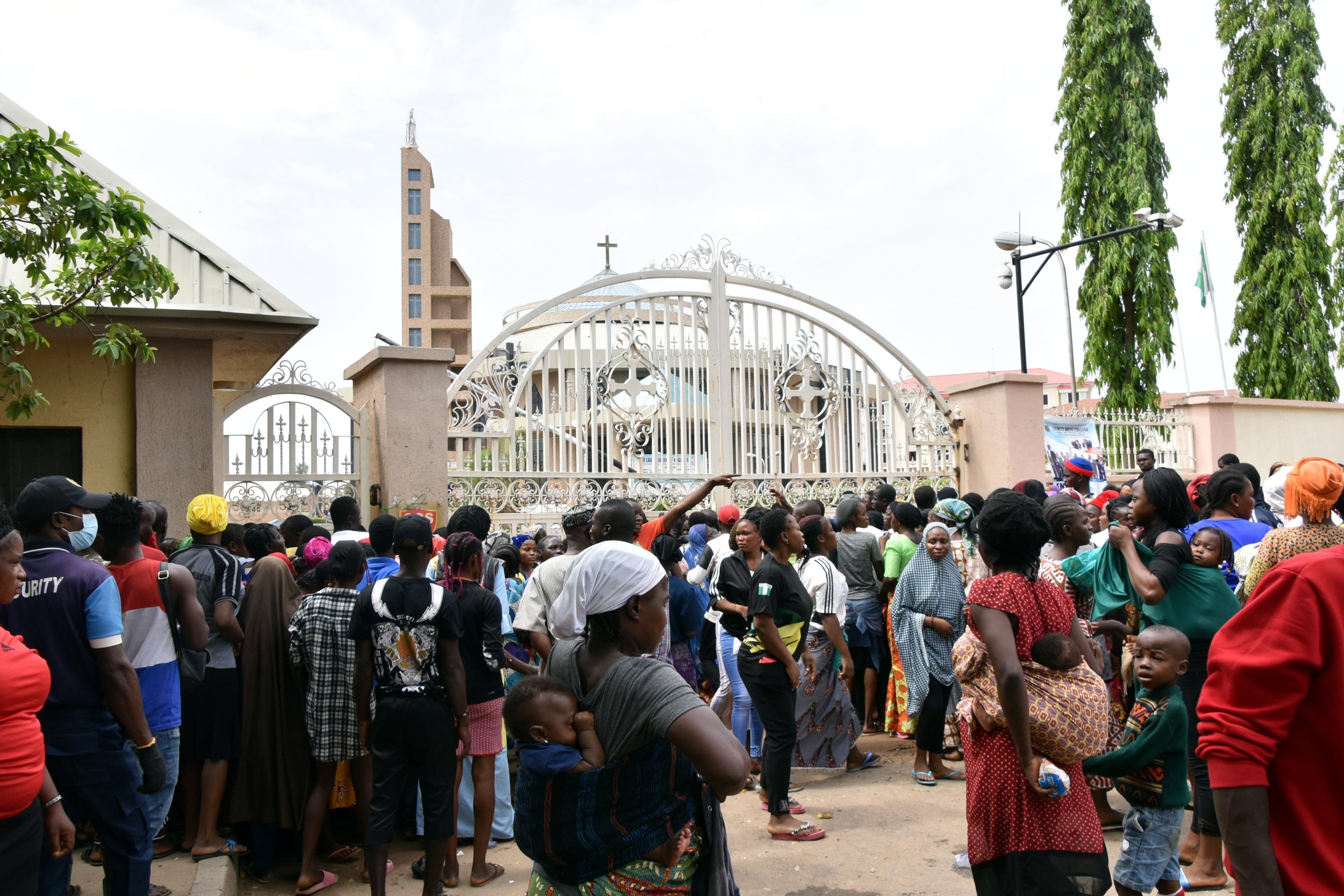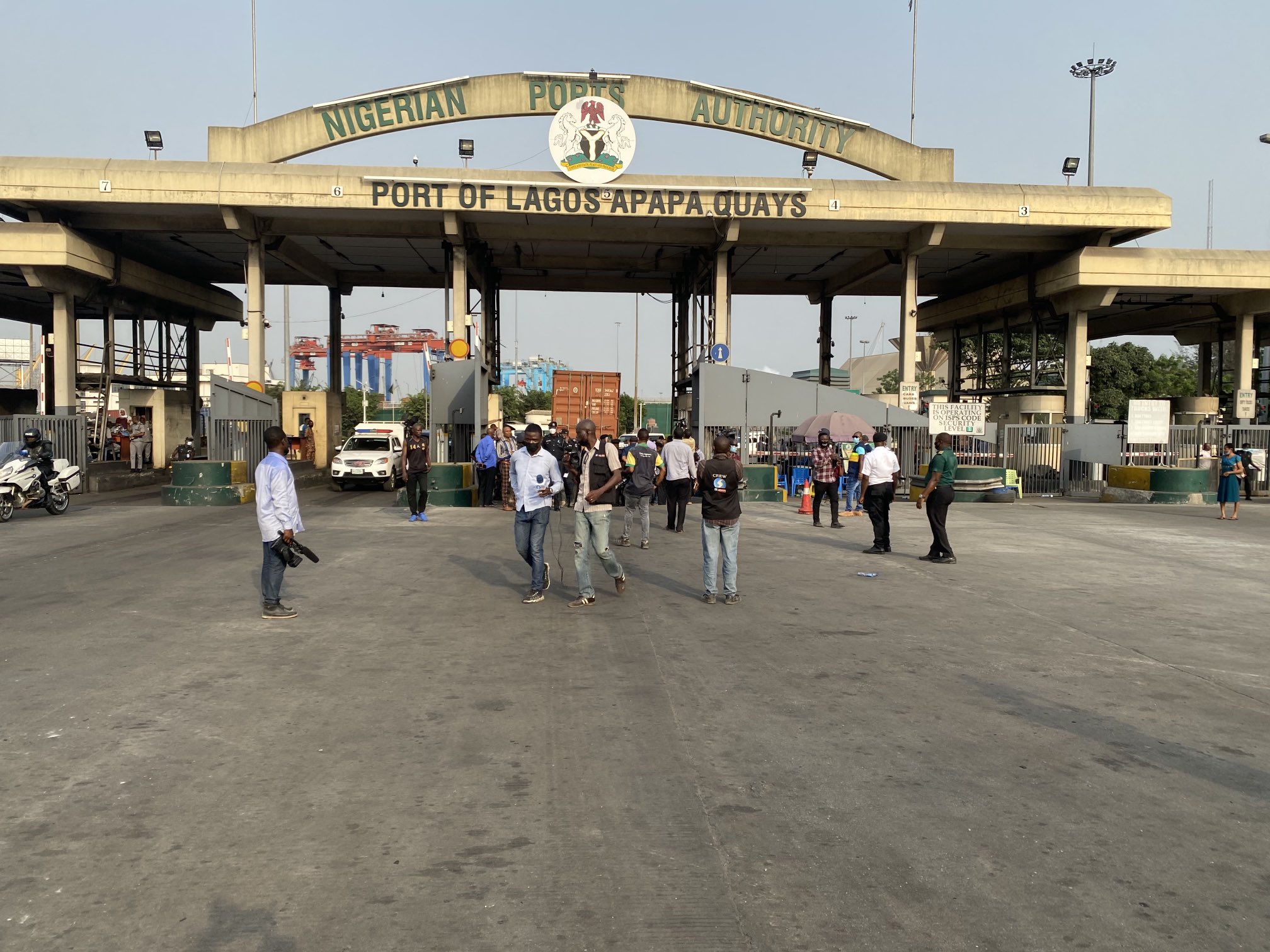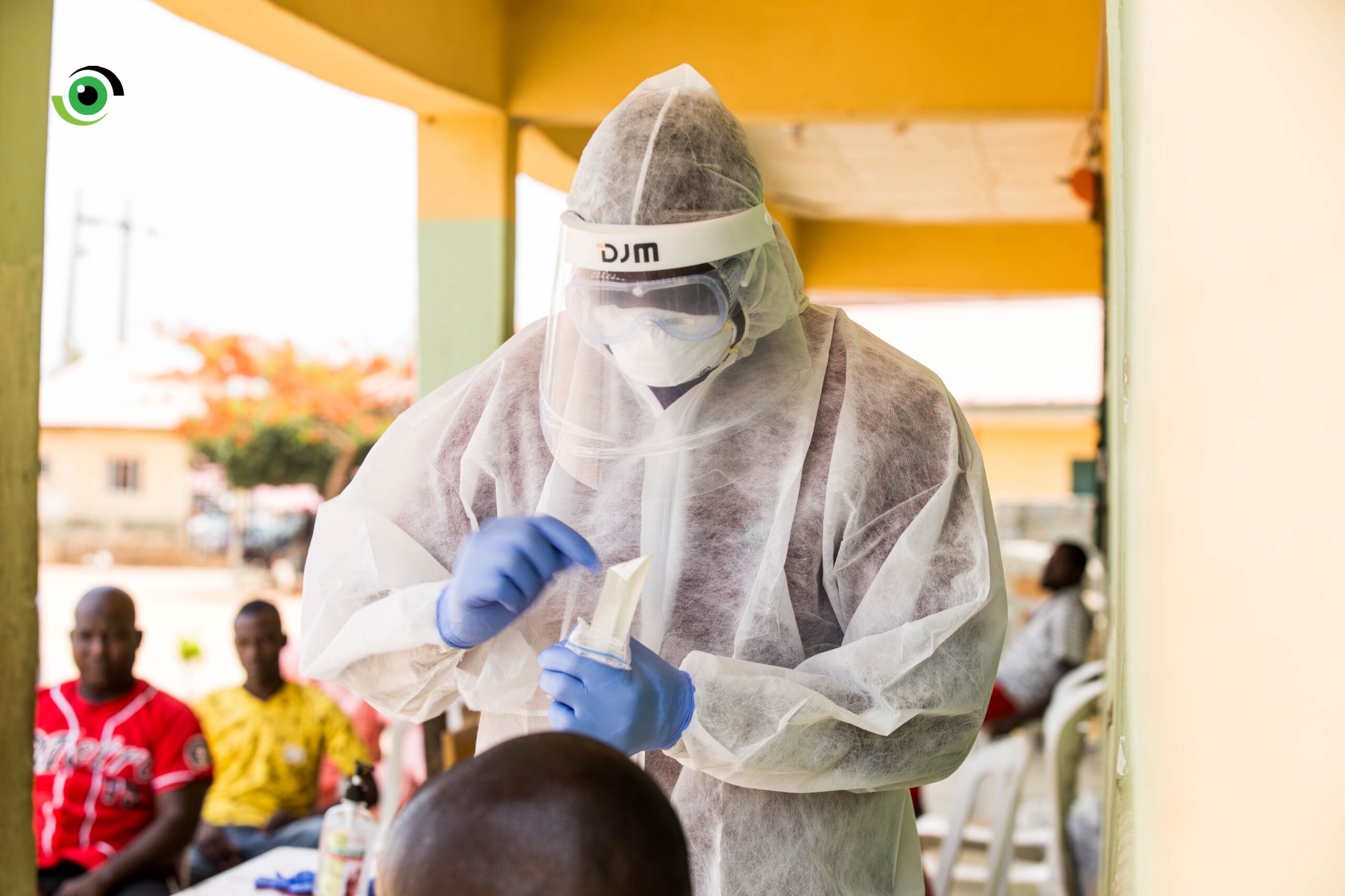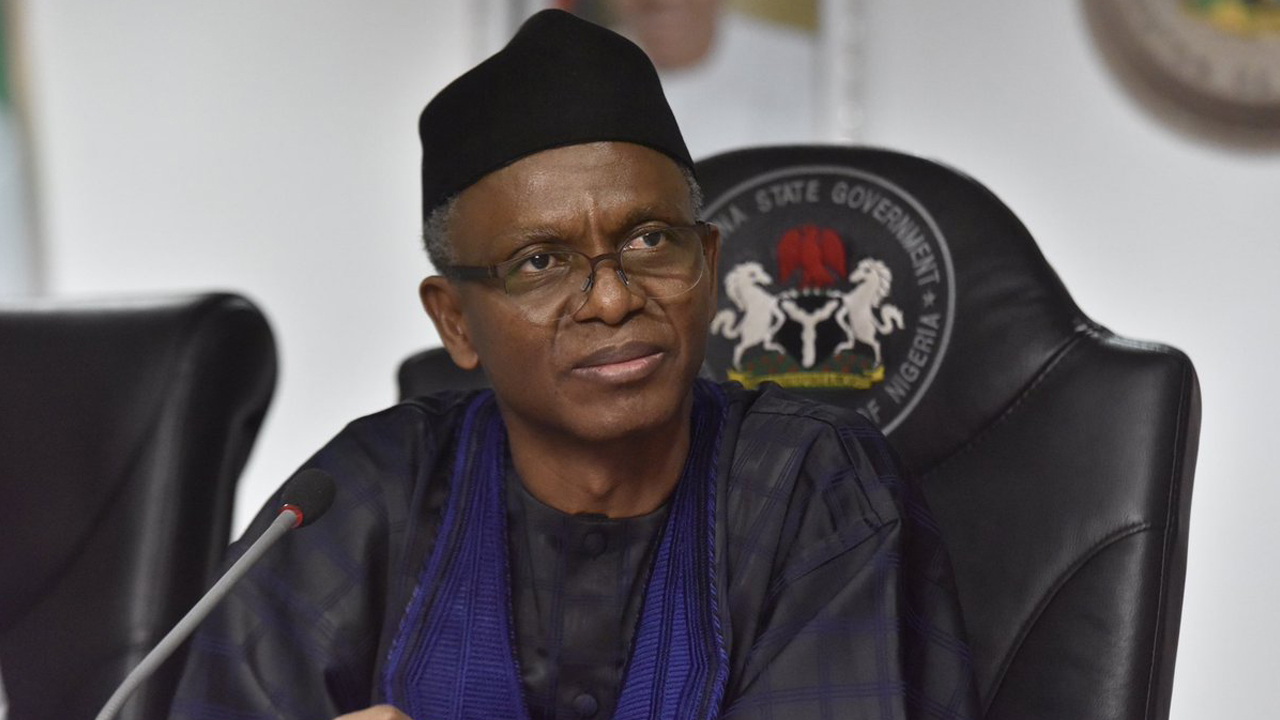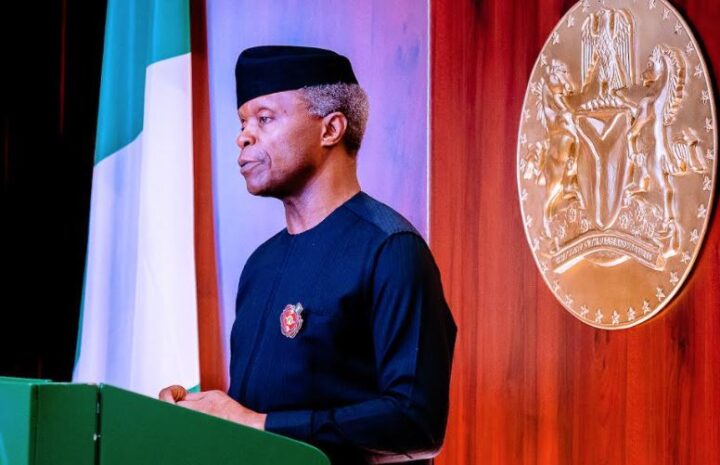Pic 10. Internally Displaced Persons from some IDPsCamps in Abuja who besiege the entrance gate of Our Lady Queen of NigeriaPro-Cathedral Garki looking for food on Good Friday in Abuja (10/4/2020)02017/10/4/2020/Callistus Ewelike/NAN
FRANCIS ANEKWE OBORJI
For some weeks now, some individuals have raised some concerns about the practice in the Catholic Church parish communities in Nigeria, of demanding from Catholics living outside their ancestral hometowns, for clearance of their outstanding Annual Church Fund (A.C.F), before burial, or have their marriage banns signed by the parish priest. Because, this issue has continued to raise some dust, both within and outside the Catholic Church sphere in Nigeria, there is need to revisit it in our present article.
The practice of the Catholic Churches in Nigeria, requesting adult (Catholics) residing outside, in big cities and towns, for clearance of their outstanding levies of A.C.F, before permission for church burial or marriage banns, is in line with our African culture and tradition of payment of obligatory levies or annual dues, for community-based developmental projects in one’s own hometown.
In principle, this practice, in spite of the increasing criticisms from some quarters against it, is one way of promoting communal solidarity spirit in the world today, where such values are hard to come by again. Contextualising and fine-tuning it, has its own values. In general, the local community still sees it, as a valuable norm, a heritage from our traditional African society, which could be modernised and put into greater use.
Advertisement
In a typical traditional Igbo society (in Eastern Nigeria), for example, the villagers as a community, do not participate at the burial ceremony or even marriage celebration of any adult indigene of that village or town, who has some outstanding financial debts for the community, for clearance. The villagers do not attend the burial or marriage ceremony, of any of them (an adult), who is not a financial bona fide member of the community, who failed to identify, in one way or the other, with the village (or town), in community development projects, meetings, age-grade functions, etc.
That is, of any indigene of the town that neglects to pay his annual contribution due for town developmental projects, and for security of lives and property of his people back home. This is irrespective of whether one is residing outside (abroad) his native town, or is living in the village itself. The Igbo village-system of society organisation, favours this tradition of community solidarity.
In fact, participation in community development projects, age-grade functions, or regular fulfilment of one’s financial obligation, to one’s native community, among the Igbos, is naturally, seen by the people themselves, as something obligatory to every adult indigene of every town, judged to be economically, and gainfully, employed.
Advertisement
The poor and indigent members of the community, are however, exempt from the financial obligations. Such people, however, are expected to make it up, by either taking up by themselves, to be helping in sweeping the village square or any other communal public civic duty. Which in our own context, for indigent Christians, may mean, lending some help in cleaning the church compound, or weeding the parish garden, etc.
Today, especially, in Igboland, at the local church parish community level, for example, such a token financial contribution by every adult indigene of the town, is what the local church, formerly called “A.M.C” (Annual Mass Collection). Today, it is called, “A.C.F.”(Annual Church Fund). Such fund or contribution from the faithful, assists the local church-community in its financial needs, charity works, and developmental projects. It is part of the local Church’s effort and attempt towards becoming self-reliant, self-propagating and self-sustaining Church in Africa.
Again, in the context of the local church community in Igboland, it is the concretisation of the Igbo philosophy of “Edozieuno” or “Aku Ruo Ulo.” That is, the traditional Igbo “think-home” philosophy! The Igbo wisdom saying, “Onye aghana nwanne ya” – “Don’t leave your brother (community) behind.” (Be your brother’s keeper).
This effort to make an African local church be financially inward-looking, self-reliant and self-supporting, is very cogent today than ever. Otherwise, African churches will continue to be dependent churches in all ramifications, on the rich local churches of Europe and North America. Taking into consideration that ours is still a young church in a Third World country like Nigeria, struggling to survive economically, it will be expecting too much that our local churches be judged with the same standard obtainable in the local churches of Europe and North America.
Advertisement
In Europe, for instance, their churches have very solid foundation, financially and otherwise. These are local churches founded almost 2000 years ago. In spite of secularism sweeping through the Western world, still, majority of their citizens have continued to identify themselves as professed Christians.
Today, in some countries, like German, Italy, Austria, Poland, Spain, Portugal, etc., the government helps the local church in collecting what they call “church tax” (In German: “kirche steuer”). In these countries, the government deducts certain percentage, each month, from the monthly salary of every citizen, and pays it to the diocesan account of the church the individual has indicated he or she belongs. In other words, the State helps the local church in collecting “church tax” from the citizens, something, unthinkable in our African (Nigerian) context.
That is one of the ways, citizens of those traditionally, “Christian” countries in the Western world, contribute financially, to the upkeep of their local churches and parish communities. In spite of that however, they still pay the ‘Mass stipend’ for burial and marriage ceremonies.
Moreover, as Christian communities with ancient Christian roots and buildings, many of the local church communities in Europe and North America depend principally, on the proceeds they make from their rented buildings and structures, which they have rented for commercial purposes to interested companies or individuals.
Advertisement
Unfortunately, for our Nigerian (or African) young and poor local churches, these opportunities and structures in Europe and North America, to sustain financially, the local church communities are not there. Therefore, in as much as we look forward to the day, the Catholic Church in Nigeria, will critically re-examine once more, the practice of asking the Annual Church Fund clearance due (A.C.F.), from its members, modernise it, at the same time, however, we must not lose sight of the many advantages of this practice in our local context.
The truth behind the practice in the Nigerian Catholic Churches
Advertisement
The question is, “Why do Catholic Churches in Nigeria demand clearance of outstanding A.C.F dues from Catholics residing outside their hometowns, before granting them permission for church burial or marriage banns, back home?”
I remember having taking up this case with one of our Bishops, some years ago. That is, the complaints that those Catholics who live outside their ancestral hometowns, and have not been fulfilling their financial obligations of (A.C.F.) to their hometown parish church community, are usually, asked to do so before permission for burial or marriage banns! Again, this practice is mainly common in Igboland local church parish communities. The Bishop, I spoke with, of course, came from this part of the country.
The Bishop, however, explained to me, that this particular case was on several occasions, raised at the level of their Episcopal Conference meetings, especially, by their colleagues from the Northern and Western parts of the country, where majority of Ndigbo, outside Igbo territory, often reside for purposes of work or trade. He said that because of the heat the case was generating at the Bishops’ meetings, they, the Bishops from Igboland, had to take some time to explain to their colleagues, why we have such practice in Igboland local church!
Advertisement
The Bishop said that they told their colleagues, Bishops from other parts of the country, that Igbo man, by nature, has obligation to at least two major communities. A typical Igbo man knows that he is obliged to contribute, to the financial upkeep of his ancestral hometown, and of course, to that of the place of his sojourn. The fact that an Igbo is residing in another town or city, outside his ancestral hometown or village, does not excuse him from fulfilling his financial obligations to his ancestral hometown, which includes his financial obligations to the local church parish community of his hometown in Igboland!
Ndigbo, by nature, travel a lot. A good number of them reside outside their homeland or towns and villages. Most of them engage in commerce and trade. No wonder, they are called, “Jews of Africa.” Today, in Nigeria, for example, and in most cases, as a result of the way Igboland came to be short-changed in infrastructural development by successive federal governments of Nigeria, especially, since the end of Nigeria-Biafra War in 1970, many Ndigbo were forced by that situation, to live outside the boundaries of their ancestral land, in search of greener pasture. Of course, many of them are constrained to do so by shear necessity to survive, in the midst of a very hostile economic condition, in one’s homeland.
Advertisement
In most cases, in such a situation, the financial sustenance of those left at home, in Igbo towns and villages, to a great extent, depends on the financial assistance and contribution, coming from their relatives and people living in big cities, towns or Diasporas. At the same time, wherever an Igbo person goes, either for purposes of work, trade, or whatever, he always carries with him, the welfare of his town and people back home.
For instance, the magnificent churches in many Igbo towns and villages, we see today, were built through such communal efforts and solidarity. And not principally from the meagre financial strength of the peasant farmers and old people left at home in villages by their relatives to migrate to big cities, within and outside Igboland. Rather, it is through the financial contribution and solidarity of Igbo sons and daughters living in big cities and towns within and outside Igboland, and even outside Nigeria.
These are the people, whose financial contribution and efforts, communally, and collectively, built most of those magnificent churches, parish halls, rectories, convents, and other such community projects, like community secondary schools, town halls, post offices, civic centres, clinic, hospitals, and even some roads and culverts, etc., that dot many towns and villages in Igboland today. These community civic and religious buildings and other structures were constructed and built, thanks to contributions from indigenes of those towns and villages, who reside in big cities and towns, and who, from there, fulfil their regular financial obligations for developmental projects and security of lives and property of their people back home in Igboland. Because, the people know that the elderly ones and often peasant and unemployed relatives, staying in the their home villages and towns, can hardly afford three square meals a day, not to talk of contributing money to embark on such gigantic developmental projects.
Even the gift of car and other solid gifts priests and religious receive at their reception after Ordination or Religious Professions, are, thanks to the contributions, received by the local church parish community from the indigenes of the town living in big cities. Most of the time, some of the parish priests go out of their way, to visit members of their parish church community living in the cities, to solicit for financial assistance, to buy car or other solid gifts for a newly to be ordained priest or professed religious. Parish priests scout for money from the indigenes of the town where they work, who live in big cities, for building new churches, parish houses, hospitals, schools, receptions after priestly ordination and religious profession, etc.
All this shows that the great value Igbo society attaches to communal solidarity spirit and developmental projects, as well as harmonious relationship between indigenes living outside and those at home, for this type of promoting community development and sense of community life, should not be underestimated.
Simply put, the so- church “clearance levies” for burial or marriage ceremonies, are nothing other than, the stipulated A.C.F (Annual Church Fund collection), dues which every bona fide, practising Catholic (whether home or abroad), is expected to contribute annually, for the financial upkeep and developmental projects of his hometown local parish church community. That is, not withstanding, whether the individual makes such financial contribution to the local church community of the place where he resides in big cities or Diaspora.
In the case of someone who has not been fulfilling this obligation, the due serves also, as registration fee to the following principal statutory (lay) organisations of the local parish church community: a) Catholic Women Organisation (CWO), b) Catholic Men Organisation (CMO), c) Catholic Girls Organisation (CGO), and d) Catholic Boys Organisation (CBO). I think, CGO and CBO, are now merged, and are called, Catholic Youth Organisation of Nigeria (CYON). Every practising Catholic, whether at home or abroad, is obliged to belong to one of these statutory church organisations, as a bona fide Catholic member from that particular parish church community in his hometown.
Therefore, the local church community fund (A.C.F.) “levy”, is nothing other than, a token to prove one’s commitment to his/her hometown parish church-community. That is, participating financially, as an African, in the affairs of the local church-community, in one’s own hometown.
The African philosophy behind the practice
The last point is very important, especially, when we remember that as Africans, we are basically, ethnic-based, thanks to our African traditional societal organisation and mode of inter-relationship between neighbouring ethnic-nationalities. The attempt to force upon African people, by colonial masters, the Western model of “nation-state”, is, in most part, responsible for the perennial political instability and civil wars going on in many modern African nation-states today. In Africa today, we have nation-states everywhere, covering a certain geographical space, created by European colonial masters. They all have within their national territories different kinds of ethnic, cultural or religious groups. Conflicts among these are common even today, although they are not violent everywhere.
This model of nation-state, was forced on Africa at independence. The model is based on a kind of political theory that developed in Europe during the Enlightenment which sees the state as a collection of individuals, who have their inalienable rights, but who, in pursuit of their self-interest, come together to set up structures of common living, spelt out in contract. They insist on the dignity and rights of every individual. This principle, however, promotes healthy contract of individuals, but on the contrary, it ignores natural communities like families, kin groups, etc.
African communities, on the other hands, are not based on this theory of individualism. The basis of community in African cultural setting, is in relatedness. Every human being has the experience of being in relationship with others for his/her origin, life, culture and celebration. To live in a community is to develop such sustainable relationships. Relationship is found in such qualities as a respect for the traditions of one’s own and others’ cultures; recognition of one’s shared humanity; and an understanding of, and even empathy for the meaning others impart to their beliefs, values and needs.
Thus, once we go beyond individualism as the basic element of society, then we discover that a nation is actually a community of communities, because a nation is not a conglomeration of individuals, but is made up of a variety of ethnic, cultural and religious groups. People in a national community do not relate to each other only as individuals, but as members of particular groups, each with its own identity. Each group attempts to protect its identity and deserves recognition and respect. Of course, the groups should not be allowed to stifle the freedom of individuals in the name of preserving and defending group identity. But the groups have a right to be recognised and respected. In other words, respecting community identity goes side by side with citizenship of individuals. The contrary would be communalism.
In the context of African local church communities, this, in essence, could be interpreted as follows:
In the first place, a local church-community should be defined concretely as, “an integrated church community in a particular locus whether it be town, station, community, parish or even a diocese where members by themselves interact in order to provide for all they need for the life and work of the church community in the particular locus of our reference.”
This, in essence, means that where a group of Christians in a definable church community, within a definable locus, work together to provide all that they need for life, work and progress of their particular community, such a community would qualify as a local church community and all its members as local church community members. Here the emphasis is more on community than on a geographical location. A local church community therefore, does not mean the same thing as “indigeneity” with the geographical location of that community, but rather with the integrity of the church community situated in a particular locus.
As I explained elsewhere, in an earlier work, an example of such a local church community, will be where, a group of Lebanese Catholics live together and set up a basic church station in a village in Mbaise (Eastern Nigeria). They set up a basic church community in that place, which they contribute to build up from their resources, their church community would, in this regard, qualify as a local church community in that particular geographical location under the diocesan Bishop of Mbaise. Care is to be taken that it be not understood that the said church community is exclusive to only Lebanese.
A second illustration would be, where the Christians from different parts of the world or of a particular country, gather as a community and from their efforts and resources corporately strive to build up a church community in a particular place. The community so built qualifies as a local church community in that place.
Another example, would be where Christians, who are living in their own geographical native place together with Christians from other places of origin but residing in that same place and integrating with the indigenes of that geographical location, build up a church community from their corporate resources together with the indigenes of that geographical location. They form one local church community even if those of the other non-indigenous members might be lending support or help to the church formations located back in the places of origins of their ancestors.
My submission is that the foregoing descriptions of church formations, especially, the last point, illustrate in a more eloquent way, the argument of this article. As the Book of Revelation shows, in the Christian community, “there are uncountable people from different nations, languages and races, who have come together to worship the victorious Lamb” (cf. Revelation, 7).
The Church in essence is therefore, a diversified community of many nations, ethnic-groups and languages. The churches in Africa or any other are not excluded from this essential quality of the church. The flourishing of the Christian community in Africa, will be measured by the quality and depth of the relationships it will forge among its members and with their diversified communities. The ethnic-cultural and religious consciousness of the African people is not, then, a matter of withdrawal and seclusion from others, but a consciousness of being bound up intimately with the people and communities all around.
As someone said, sometimes those who complain about the Church’s practice of demanding from Catholics residing outside their ancestral hometown, clearance of outstanding A.C.F dues, before granting permission for burial or marriage banns, a good number of these people, belong to the category of lukewarm or fallen away Catholics. In fact, experience has shown that the only time you see most of them in the church, is when they are at home in the village, for such big occasions like burial or marriage ceremonies of their relatives or friends. Otherwise, another time you see them, is when the remains of such an individual (or relative), is brought to the church for burial.
This is, found, especially, among the young adults. Most of our young people living in big cities or towns (home and abroad), often do not bother to identify with the parish church community in their hometown or village, especially, when they visit home. Only when they are about to get married, have their marriage banns signed, or are preparing for the burial of their relatives, do you see them approach their hometown parish church and parish priest.
Another thing is that most of them have since stopped attending Catholic Church, even in their places of abode in cities and other places. Some of them, while claiming to be Catholics (by birthday or from childhood in the village), now frequent pastors of the New Religious Movements or Neo-Pentecostalism. Some of them do it in hiding, not knowing that somebody might have seen them. They are quick to pay hundreds of thousands of Naira to their pastors of those New Religious Movements as tithes, but when it comes to contributing the little stipulated token fee of A.C.F., they begin to complain vehemently against the Catholic Church or the parish priest in their hometown.
Sometimes, it is difficult to know exactly which church this group of people now belong to. Because most of them forget that even in our Nigerian context (that is, as a way of example, since we cannot equate the practice in the Church with that of social clubs or civil society organisations). Is there any club or society one belongs to that doesn’t have their clearance? As one person wrote, “What makes you a bona fide member if not your financial stand?” With baptism, however, one is incorporated into the Church and becomes a member. But this does not dispense the person from doing what other members are doing for the continued existence of the Church and its pastoral activities in one’s homeland. As the Apostle James teaches us, “faith without good work, is dead” (James 2:17).
Moreover, in our own local setting, as explained earlier, since these individuals are natives of the place, and have the obligation to pay their dues for their hometown local parish church community developmental projects, the local church parish community, uses that opportunity of burial or request for marriage banns, to request from them, the stipulated A.C.F token fee. It is as simple as that! This is more so, because, any relatively conscious Igbo person, is aware of his/her financial obligations to the two principal communities (home and abroad), which he/she belongs.
As someone recently, observed, the majority of those who pick a quarrel with the Church over this long-established, standing Igbo community solidarity tradition, appropriated by our local Church, mainly, come from the class of those who want to enjoy all the social atmosphere offered by the Church’s liturgical style of celebration of weddings or funerals, but don’t want to be committed Catholics. Such individuals, often, do not have any interest, so to say, towards advancing their Christian life or promoting pastoral activities of the Church in their place of origin.
CONCLUSION
A truly African Christian is someone who knows the value of witnessing to the multi-dimensional aspect of African sense of community life. Who does not know the central role the Church has come to play today in advancing the Igbo culture of communal solidarity spirit, in our contemporary Igbo society?
Again, this practice is in line with the African philosophy of relationality and interconnectedness. That is, the constant good relationship and contact, every conscious African is expected to cultivate and maintain, between himself and his hometown parish church community, as well as with the community, the person lives as sojourner, for purposes of work or trade, or whatever.
In fact, for the Igbo, it is only by maintaining such interrelatedness and harmonious relationships, in all its ramifications and respects, in a pluralistic society like Nigeria, that one lives the fullness of life, in constant relationship with one’s people, the living and the death (ancestors (the living-death, as John Mbiti calls them). This is what makes Igbo society and people, unique. It is what is helping them today in bringing social development and civilisation to every nook and corner of Igboland, and beyond.
The Igbo sees this practice as part of the responsibility of his people living in big cities and diasporas, to be at the forefront of providing the financial assistance, needed in advancing the community development of his ancestral homeland and people. In fact, without such financial assistance, and help from Ndigbo (home and abroad), most of our little ones living in villages, will be out of school. A good number of our churches also, will even close. Because, as we know, these parish churches and priests working there, are not maintained through the meagre financial contribution of our peasant population in villages, or their Sunday collections, but rather through the financial help that often come from the indigenes living in big cities and towns.
This is why Igbo community solidarity spirit and communal financial contribution of indigenes (home and abroad), of this kind, should be encouraged, even as the local church looks for a better way of modernising the practice, to correct the existing excesses. The practice can be fine-tuned, so that poor people, who couldn’t meet up with their financial obligations, even if they live outside their villages, are not turned away from receiving assistance for church services from the parish church community in their villages or hometowns.
Views expressed by contributors are strictly personal and not of TheCable.
